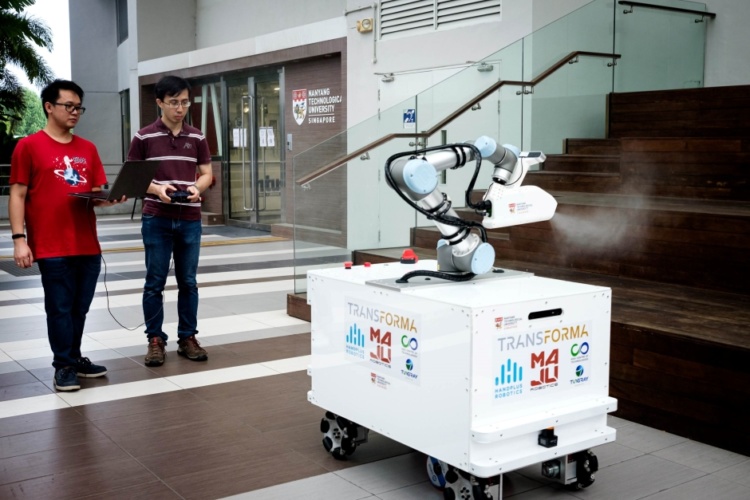Developed by researchers from Nanyang Technological University, Singapore (NTU Singapore) the eXtreme Disinfection roBOT (XDBOT) can be wirelessly controlled via a laptop or tablet, removing the need for cleaners to be in contact with surfaces.
MORE ON THE ENGINEERING RESPONSE TO COVID-19 HERE
Comprising a semi-autonomous control unit with motorised wheels, XDBOT has a 6-axis robotic arm that can mimic human movement to reach awkward locations such as under tables and beds, as well as doorknobs, tabletops and light switches.
Instead of a conventional pressure-spray nozzle, it uses an electrostatic-charged nozzle to ensure a wider and further spread of the disinfectant, behind and over hidden surfaces.
Unlike typical nozzles, XDBOT’s nozzle discharges chemicals with a positive electrical charge. These disinfectants will then be attracted to all negatively-charged surfaces. Surfaces already covered with the disinfectant will then repel the spray, making this method very efficient.
Professor Chen I-Ming, project leader and a roboticist from the NTU Robotics Research Centre, said the XDBOT was conceived when COVID19 cases started to spike worldwide in mid-February and disinfection efforts were being stepped up at Changi Airport, local hotels and hospitals.
“To stop the transmission of a virus means we need a way to quickly disinfect surfaces, which is a labour-intensive and repetitive activity,” Prof Chen said in a statement. “Using our new robot from a distance, a human operator can precisely control the disinfection process, increasing surface area cleaned by up to four times, with zero contact with surfaces.”

The XDBot was developed by NTU scientists working with Transforma Robotics and two other NTU spin-offs, Hand Plus Robotics and Maju Robotics,along with industry partners Asia Centre of Technologies (ACOT) and Tungray Singapore Pte Ltd.
Developed and built on the NTU Smart Campus, the robot went from a theoretical concept to an operational prototype in two months.
According to NTU, XDBOT can navigate semi-autonomously in any environment using LIDAR (Light Detection and Ranging) and high-definition cameras, while its arm is controlled by a human operator.
Currently, the operator can control the robot from up to 30m using a laptop/tablet, which can be increased to 50m or further with more antennas installed on XDBOT.
The robot has an 8.5l tank that can carry a variety of disinfectants appropriate to different environments, and it can operate for four hours continuously on a rechargeable battery pack and is estimated to be able to disinfect a surface area of up to four times that of manual cleaning.
Battery recharging currently takes eight hours, but the researchers said this can be further improved if quick-charging technology is adopted.
The team is said to be in talks with several healthcare institutions and hopes to further test the prototype at more public areas and local public hospitals.
If trials are successful and with sufficient commercial demand, the three spin-offs aim to develop a production-ready version of the XDBOT and scale up production.




Glasgow trial explores AR cues for autonomous road safety
They've ploughed into a few vulnerable road users in the past. Making that less likely will make it spectacularly easy to stop the traffic for...